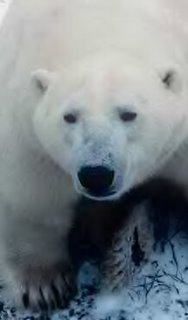My money is on the Polar Bear but a very close second for me would have to be the Mountain Gorilla. WKD wants the Orang u tang to win, then the old favourite for almost everybody could be the Bengal Tiger.
Knowing the British public however there is likely to be a surprise and the upset could come from the celeb that presented the best film. In my opinion then the winner could be The Leatherback Turtle because I really did think the best film presented was from Dermot O Leary. It was magical tv.
Peculiar sort of programme, very brave to persuade the good old public to donate to a charity that they wouldn't usually support. Overall I have to say I've enjoyed the programmes and it also has to be said that in the WILKONEWS offices, Thursday night the video rolled for it as opposed to Holby City a long time favourite of us all here in askdad.com land.
I really do know though whatever happens it won't be that parrot/macaw thing, though they are very pretty they will not ever become extinct while they are brave enough to meet Michael Portillo!
Not to influence you at all in any way shape or form but a vote for anything other than the Polar Bear will be null and void!!!!!!!!!
Polar bears are the top predator in the arctic marine ecosystem. They evolved from brown bears during the Pleistocene, the time period that spanned from 1.8 million to 11,000 years ago. The polar bear's coat, covering it completely except for the nose and foot pads, is superbly adapted to Arctic environments, where temperatures rarely exceed 10 °C (50 °F) in summer and typically hover around -30 °C (-22 °F) during winter. Polar bears are excellent swimmers and can sustain a pace of 10 km/h by using their front paws like oars while their hind legs are held flat like a rudder. They spend much of their time at or near the edge of the pack ice. This is where they are most likely to find food. As the southern edge of the arctic ice cap melts in summer, some bears will follow the retreating ice north to stay close to seals and other prey. Other bears spend their summers on land, living off body fat stored from successful hunting in the spring and winter. When the ice returns in the fall, the bears leave land to resume life on the sea ice.
Saturday, December 16, 2006
RAY TO WIN BUT WHO IS GOING TO WIN EXTINCT?
Reported by
SIMON
at
12:38 am
![]()
Subscribe to:
Post Comments (Atom)






No comments:
Post a Comment